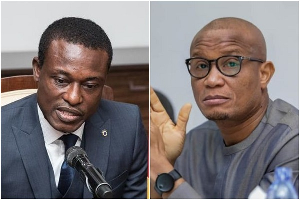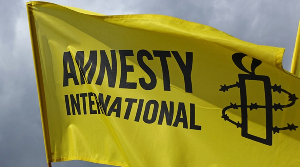General News of Tuesday, 12 February 2019
Source: mynewsgh.com
Ghana must retaliate U.S Visa sanctions in equal manner - Ras Mubarak
Member of Parliament (MP) for Kumbungu, Ras Mubarak says although Ghana has been hit by sanctions by the United States government over its refusal to take back deportees, the US Ambassador to Ghana visited Parliament and none of them had the “guts and courage” to raise the issue on the floor.
New US Ambassador to Ghana, H.E. Stephanie S. Sullivan paid a courtesy call on Parliament and the Rt. Hon. Speaker Prof A.M. Ocquaye on February 4th this year.
Mr Mubarak is of the opinion that Ghana should not kowtow to the US-visa sanction but rather retaliate in an equal manner.
He made this statement over the weekend at the 40 years anniversary of the Iranian revolution which was organized by the Cultural Consulate of the Islamic Republic of Iran, held at the Institute of African Studies, University of Ghana.
The MP expressed his disappointment at the development of the situation and charged the Ghana government to assert its sovereignty.
“Our country has been sanctioned by the US, sanctions which have affected the members of the Executive and the members of Parliament. She (US Ambassador Sullivan) went to Parliament and nobody had the gut or courage to bring the issue on the floor. That was unfortunate”, he told the gathering.
He expressed his disappointment Ghana “as a sovereign and independent nation, we are not asserting our authority”.
Visa sanctions
Ghana has been hit with visa sanctions by the United States of America for its purported lack of cooperation in accepting Ghanaians deported from the US.
The US Secretary of State Mike Pompeo ordered embassy officers in Ghana to implement the visa restrictions on certain categories of visa applicants, according to a US Department of Homeland Security statement and these sanctions cover Members of Parliament and the Executive.
Other categories of applicants to be affected are not elaborated on in the statement. “Pursuant to her authority under Section 243(d) of the Immigration and Nationality Act (INA), Secretary of Homeland Security Kirstjen Nielsen notified Secretary of State Mike Pompeo that the Government of Ghana has denied or unreasonably delayed accepting their nationals ordered removed from the United States,” the statement explained.
In addition, the statement warned that Ghana faced more sanctions if the government’s posture did not change.
“Without an appropriate response from Ghana, the scope of these sanctions may be expanded to a wider population. The sanctions will remain in place until the Secretary of Homeland Security notifies Secretary Pompeo that cooperation on removals has improved to an acceptable level.”
Foreign Affairs Ministry replies
Government in response has said the allegations of non-cooperation by the US government over the deportation of some Ghanaians leading to visa sanction on Ghana are “unfounded”.
According to the Foreign Affairs Ministry, it has always cooperated and engaged the US authorities in processing and removal of Ghanaians from the US.
In a statement released following the announcement of sanctions, the Ministry said it has noted, “with concern and disappointment the decision of the US to implement visa sanctions on Ghana for alleged lack of adequate cooperation in accepting Ghanaian nationals who have been ordered to be removed from the US.”
It said, “As is the requirement and in accordance with international law, the Ghana Embassy in Washington DC undertakes identification and verification processes to ensure that all persons earmarked for deportation to Ghana are bonafide citizens of Ghana.”
The Ministry disclosed that as at January 8, 2019, its Washington Mission had received 28 applications from the US Authorities, out of which 19 had been interviewed by the Embassy and 11 travelling certificates issued for their travel to Ghana. It said those outstanding are as a result of doubts on their Ghanaian nationality, ill health and pending litigation in US courts.












